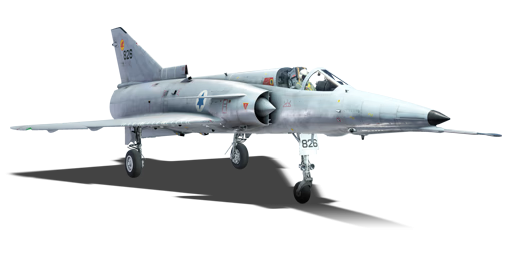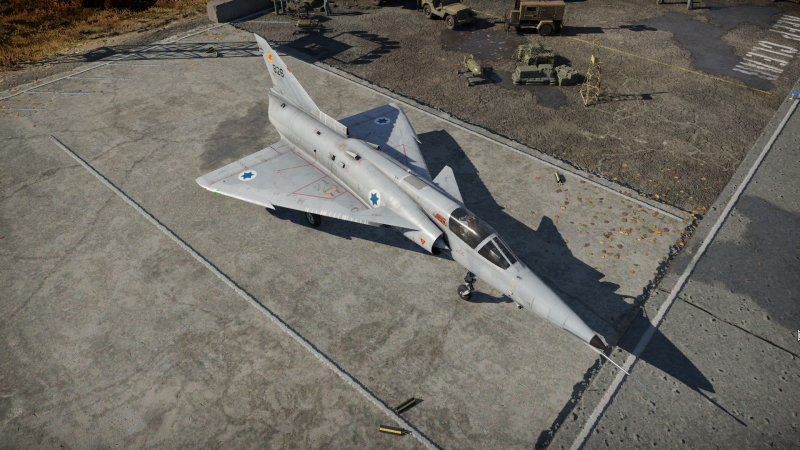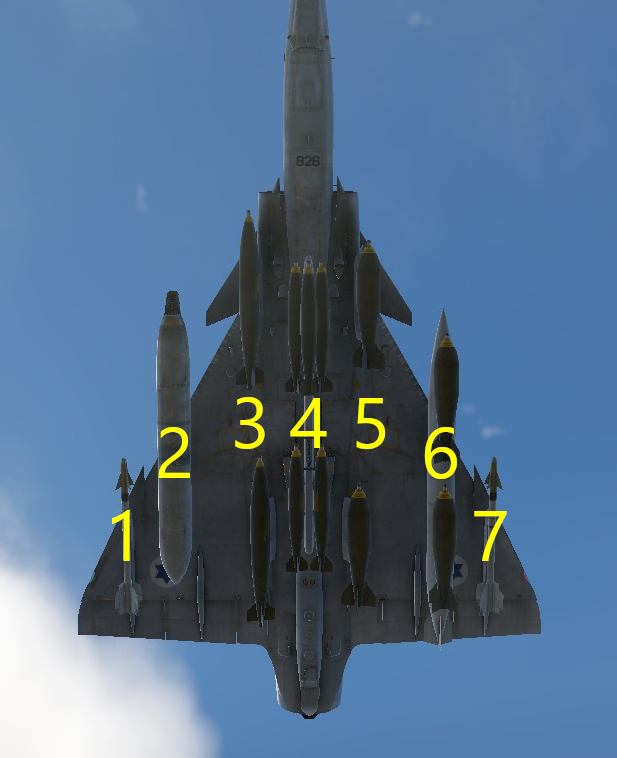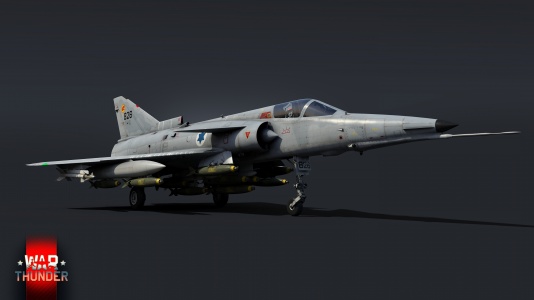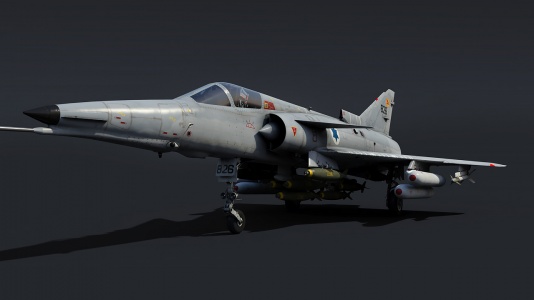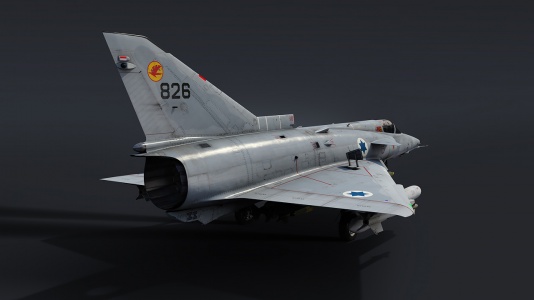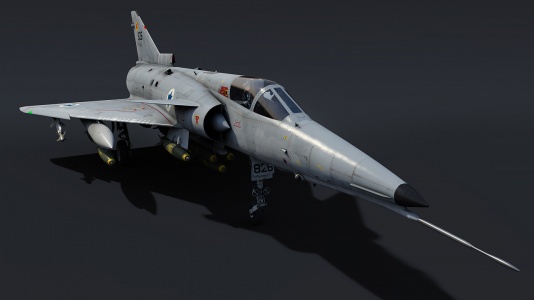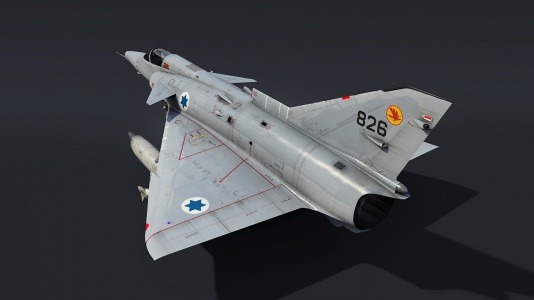Difference between revisions of "Kfir C.2"
Colok76286 (talk | contribs) (→Media: Added images) |
(→Suspended armament) |
||
| (26 intermediate revisions by 10 users not shown) | |||
| Line 1: | Line 1: | ||
{{About | {{About | ||
| about = gift Israeli jet fighter '''{{PAGENAME}}''' | | about = gift Israeli jet fighter '''{{PAGENAME}}''' | ||
| − | | usage = | + | | usage = other versions |
| − | | link = | + | | link = Mirage 5 (Family) |
}} | }} | ||
{{Specs-Card | {{Specs-Card | ||
| Line 12: | Line 12: | ||
== Description == | == Description == | ||
<!-- ''In the description, the first part should be about the history of and the creation and combat usage of the aircraft, as well as its key features. In the second part, tell the reader about the aircraft in the game. Insert a screenshot of the vehicle, so that if the novice player does not remember the vehicle by name, he will immediately understand what kind of vehicle the article is talking about.'' --> | <!-- ''In the description, the first part should be about the history of and the creation and combat usage of the aircraft, as well as its key features. In the second part, tell the reader about the aircraft in the game. Insert a screenshot of the vehicle, so that if the novice player does not remember the vehicle by name, he will immediately understand what kind of vehicle the article is talking about.'' --> | ||
| − | The '''{{Specs|name}}''' | + | Based on the [[Nesher]], the Kfir (translates to "Lion Cub") was an Israeli program to improve their existing Mirage fleet with new avionics and the General Electric J79 engine from the [[Kurnass|F-4 Phantom II]]. Compared to the original French SNECMA Atar 9C engine in the Nesher, the J79 engine was shorter and had higher requirements for air flow and operating temperatures, so the modified aircraft holding the J79 had their rear ends redesigned for the shorter engine, with air intakes added or enlarged to accommodate the engine temperatures. The first prototype, under the name Ra'am (for "Thunder") flew on June 4, 1973, and the prototype would be accepted into Israeli Air Force service on April 14, 1975, in the 101 "First Fighter" Squadron as the Kfir C.1. The Kfir C.2 variant was the second production model after complaints that the C.1 had inferior maneuverability compared to the [[Shahak]], which saw the addition of canard (larger than that found on the [[Kfir Canard]]), leading edges on the wing, and small strakes on the nose. |
| + | |||
| + | The '''{{Specs|name}}''', introduced into the game in [[Update "Wind of Change"]] as a reward for the [[wt:en/news/7640-event-the-battle-for-arachis-en|"Battle for Arachis"]] event, shares its characteristics with the Mirage 5 lineage as a fighter-bomber, capable of performing in an air-to-air or air-to-ground role with its avionics and flight performance. Air-to-air performance is benefitted by the {{Specs|name}}'s maneuverability, especially its turn rates, to get nose onto target for guns or missiles, though missile availability is hindered to just two IR seeking missiles. For air-to-ground, the {{Specs|name}}'s ability to carry a total of eight 1000 lb bombs allows it to be able to destroy a base in air realistic mode or several armoured ground targets in ground battles. A full suite of [[Ballistic_Computer|ballistic computers allow for CCIP and CCRP]] usage that allows Kfir pilots to get their payload onto target as accurately as possible. The versatility in the Kfir's roles ensures that players are able to use it in response to different combat situations over the course of a match. | ||
== General info == | == General info == | ||
| Line 18: | Line 20: | ||
{{Specs-Avia-Flight}} | {{Specs-Avia-Flight}} | ||
<!-- ''Describe how the aircraft behaves in the air. Speed, manoeuvrability, acceleration and allowable loads - these are the most important characteristics of the vehicle.'' --> | <!-- ''Describe how the aircraft behaves in the air. Speed, manoeuvrability, acceleration and allowable loads - these are the most important characteristics of the vehicle.'' --> | ||
| − | |||
{| class="wikitable" style="text-align:center" width="70%" | {| class="wikitable" style="text-align:center" width="70%" | ||
| Line 34: | Line 35: | ||
|- | |- | ||
! Upgraded | ! Upgraded | ||
| − | | | + | | 2,442 || 2,374 || 25.8 || 27.0 || 245.5 || 204.5 |
|- | |- | ||
|} | |} | ||
| Line 60: | Line 61: | ||
! Combat !! Take-off !! Landing !! + !! - | ! Combat !! Take-off !! Landing !! + !! - | ||
|- | |- | ||
| − | | 1,460 <!-- {{Specs|destruction|body}} --> || {{Specs|destruction|gear}} || | + | | 1,460 <!-- {{Specs|destruction|body}} --> || {{Specs|destruction|gear}} || - || - || - || ~11 || ~4 |
|- | |- | ||
|} | |} | ||
| Line 70: | Line 71: | ||
! Ailerons !! Rudder !! Elevators !! Radiator | ! Ailerons !! Rudder !! Elevators !! Radiator | ||
|- | |- | ||
| − | | < | + | | < 920 || < 750 || < 1,460 || - |
|- | |- | ||
|} | |} | ||
| Line 84: | Line 85: | ||
|- | |- | ||
| colspan="2" | General Electric J79-GE-17 || 1 | | colspan="2" | General Electric J79-GE-17 || 1 | ||
| − | | colspan="2" | 7,370 kg || colspan="2" | | + | | colspan="2" | 7,370 kg || colspan="2" | 287 kg/m<sup>2</sup> |
|- | |- | ||
! colspan="3" | Engine characteristics | ! colspan="3" | Engine characteristics | ||
| − | ! colspan="3" | Mass with fuel (no weapons load) || rowspan="2" | Max | + | ! colspan="3" | Mass with fuel (no weapons load) || rowspan="2" | {{Annotation|Max Gross<br>Weight|Mass of the fully equipped aircraft with heaviest weapons load}} |
|- | |- | ||
! Weight (each) || colspan="2" | Type | ! Weight (each) || colspan="2" | Type | ||
| Line 93: | Line 94: | ||
|- | |- | ||
| 1,750 kg || colspan="2" | Afterburning axial-flow turbojet | | 1,750 kg || colspan="2" | Afterburning axial-flow turbojet | ||
| − | | 8,125 kg || 9,152 kg || 9,888 kg || | + | | 8,125 kg || 9,152 kg || 9,888 kg || 14,163 kg |
|- | |- | ||
! colspan="3" | {{Annotation|Maximum engine thrust @ 0 m (RB/SB)|The maximum thrust produced by each engine, while mounted in the aircraft. NOTE: Thrust varies significantly depending on speed & altitude.}} | ! colspan="3" | {{Annotation|Maximum engine thrust @ 0 m (RB/SB)|The maximum thrust produced by each engine, while mounted in the aircraft. NOTE: Thrust varies significantly depending on speed & altitude.}} | ||
| Line 99: | Line 100: | ||
|- | |- | ||
! Condition || 100% || WEP | ! Condition || 100% || WEP | ||
| − | ! 8m fuel || 20m fuel || 28m fuel || | + | ! 8m fuel || 20m fuel || 28m fuel || MGW |
|- | |- | ||
| ''Stationary'' || 5,200 kgf || 8,154 kgf | | ''Stationary'' || 5,200 kgf || 8,154 kgf | ||
| − | | 1.00 || 0.89 || 0.82 || | + | | 1.00 || 0.89 || 0.82 || 0.58 |
|- | |- | ||
| ''Optimal'' || 5,366 kgf<br>(1,460 km/h) || 10,978 kgf<br>(1,400 km/h) | | ''Optimal'' || 5,366 kgf<br>(1,460 km/h) || 10,978 kgf<br>(1,400 km/h) | ||
| − | | 1.35 || 1.19 || 1.11 || | + | | 1.35 || 1.19 || 1.11 || 0.78 |
|- | |- | ||
|} | |} | ||
| Line 135: | Line 136: | ||
The '''''{{PAGENAME}}''''' is armed with: | The '''''{{PAGENAME}}''''' is armed with: | ||
| − | + | * 2 x 30 mm DEFA 552A cannons, belly-mounted (140 rpg = 280 total) | |
| − | + | * 36 x countermeasures | |
| − | * | ||
=== Suspended armament === | === Suspended armament === | ||
{{Specs-Avia-Suspended}} | {{Specs-Avia-Suspended}} | ||
<!-- ''Describe the aircraft's suspended armament: additional cannons under the wings, bombs, rockets and torpedoes. This section is especially important for bombers and attackers. If there is no suspended weaponry remove this subsection.'' --> | <!-- ''Describe the aircraft's suspended armament: additional cannons under the wings, bombs, rockets and torpedoes. This section is especially important for bombers and attackers. If there is no suspended weaponry remove this subsection.'' --> | ||
| − | |||
| − | |||
The '''''{{PAGENAME}}''''' can be outfitted with the following ordnance: | The '''''{{PAGENAME}}''''' can be outfitted with the following ordnance: | ||
| − | * | + | {| class="wikitable" style="text-align:center" width="100%" |
| + | |- | ||
| + | ! !! width="6%" | 1 !! width="6%" | 2 !! width="6%" | 3 !! width="6%" | 4 !! width="6%" | 5 !! width="6%" | 6 !! width="6%" | 7 | ||
| + | | rowspan="14" width="30%" | <div class="ttx-image">[[File:Hardpoints_{{PAGENAME}}.png]]</div> | ||
| + | |- | ||
| + | ! [[GAU-4 (20 mm)|20 mm GAU-4]] cannons (1,200 rpg) | ||
| + | | || 1 || || || || 1 || | ||
| + | |- | ||
| + | ! [[LDGP Mk 82 (500 lb)|500 lb LDGP Mk 82]] bombs | ||
| + | | || 2, 3 || 2 || 5 || 2 || 2, 3 || | ||
| + | |- | ||
| + | ! [[SAMP Mk 82 250 Snakeye (500 lb)|500 lb SAMP Mk 82 250 Snakeye]] bombs | ||
| + | | || 3 || 2 || 5 || 2 || 3 || | ||
| + | |- | ||
| + | ! [[LDGP Mk 83 (1,000 lb)|1,000 lb LDGP Mk 83]] bombs | ||
| + | | || 2 || 2 || || 2 || 2 || | ||
| + | |- | ||
| + | ! [[LDGP Mk 84 (2,000 lb)|2,000 lb LDGP Mk 84]] bombs | ||
| + | | || 1 || || || || 1 || | ||
| + | |- | ||
| + | ! [[M117 cone 45 (750 lb)|750 lb M117 cone 45]] bombs | ||
| + | | || 2, 2 || 2 || || 2 || 2, 2 || | ||
| + | |- | ||
| + | ! [[FFAR Mighty Mouse]] rockets | ||
| + | | || 38 || || || || 38 || | ||
| + | |- | ||
| + | ! [[Zuni Mk32 Mod 0 ATAP]] rockets | ||
| + | | || 8 || || || || 8 || | ||
| + | |- | ||
| + | ! [[AIM-9D Sidewinder]] missiles | ||
| + | | 1 || || || || || || 1 | ||
| + | |- | ||
| + | ! [[AIM-9G Sidewinder]] missiles | ||
| + | | 1 || || || || || || 1 | ||
| + | |- | ||
| + | ! [[Shafrir 2]] missiles | ||
| + | | 1 || || || || || || 1 | ||
| + | |- | ||
| + | ! [[Python 3]] missiles | ||
| + | | 1 || || || || || || 1 | ||
| + | |- | ||
| + | ! 880 l drop tanks | ||
| + | | || || || 1 || || || | ||
| + | |- | ||
| + | |} | ||
| + | |||
| + | {{Navigation-Start|Default weapon presets}} | ||
| + | {{Navigation-First-Simple-Line}} | ||
| + | |||
| + | * 1 x 880 l drop tank | ||
* 2 x AIM-9D Sidewinder missiles | * 2 x AIM-9D Sidewinder missiles | ||
* 2 x AIM-9G Sidewinder missiles | * 2 x AIM-9G Sidewinder missiles | ||
| + | * 2 x Python 3 missiles | ||
| + | * 2 x Shafrir 2 missiles | ||
* 13 x 500 lb LDGP Mk 82 bombs (6,500 lb total) | * 13 x 500 lb LDGP Mk 82 bombs (6,500 lb total) | ||
| − | * | + | * 15 x 500 lb SAMP Mk 82 250 Snakeye bombs (7,500 lb total) |
| − | |||
* 8 x 1,000 lb LDGP Mk 83 bombs (8,000 lb total) | * 8 x 1,000 lb LDGP Mk 83 bombs (8,000 lb total) | ||
| − | * 8 x 1,000 lb LDGP Mk 83 bombs + 2 x | + | * 8 x 1,000 lb LDGP Mk 83 bombs + 2 x Python 3 missiles (8,000 lb total) |
| − | |||
* 8 x 750 lb M117 cone 45 bombs (6,000 lb total) | * 8 x 750 lb M117 cone 45 bombs (6,000 lb total) | ||
| − | * 8 x 750 lb M117 cone 45 bombs + 2 x | + | * 8 x 750 lb M117 cone 45 bombs + 2 x Python 3 missiles (6,000 lb total) |
| − | |||
* 2 x 2,000 lb LDGP Mk 84 bombs (4,000 lb total) | * 2 x 2,000 lb LDGP Mk 84 bombs (4,000 lb total) | ||
| − | * 2 x 2,000 lb LDGP Mk 84 bombs + 2 x | + | * 2 x 2,000 lb LDGP Mk 84 bombs + 2 x Python 3 missiles (4,000 lb total) |
| − | * 2 x | + | * 2 x 20 mm GAU-4 cannons (1,200 rpg = 2,400 total) |
| − | |||
| − | |||
| − | |||
* 16 x Zuni Mk32 Mod 0 ATAP rockets | * 16 x Zuni Mk32 Mod 0 ATAP rockets | ||
| − | |||
| − | |||
* 76 x FFAR Mighty Mouse rockets | * 76 x FFAR Mighty Mouse rockets | ||
| − | * | + | * 2 x Python 3 missiles + 9 x 500 lb LDGP Mk 82 bombs + 16 x Zuni Mk32 Mod 0 ATAP rockets (4,500 lb total) |
| − | + | * 2 x Python 3 missiles + 9 x 500 lb LDGP Mk 82 bombs + 76 x FFAR Mighty Mouse rockets (4,500 lb total) | |
| − | + | {{Navigation-End}} | |
| − | * 2 x | ||
== Usage in battles == | == Usage in battles == | ||
| − | <!-- ''Describe the tactics of playing in the aircraft, the features of using aircraft in a team and advice on tactics. Refrain from creating a "guide" - do not impose a single point of view, but instead, give the reader food for thought. Examine the most dangerous enemies and give recommendations on fighting them. If necessary, note the specifics of the game in different modes (AB, RB, SB).'' --> | + | <!-- ''Describe the tactics of playing in the aircraft, the features of using aircraft in a team and advice on tactics. Refrain from creating a "guide" - do not impose a single point of view, but instead, give the reader food for thought. Examine the most dangerous enemies and give recommendations on fighting them. If necessary, note the specifics of the game in different modes (AB, RB, SB).'' --><blockquote>"A quick assassin, right between the Kfir Canard and Kfir C.7"</blockquote>The Kfir C.2, being a derivative of the [[Mirage 5 (Family)|Mirage family]] and a step between the other Kfirs, it naturally plays rather similar. The J-79 engine and delta wings make it achieve stunning speeds both on the deck and at altitude (up to ~1450 km/h IAS), as well as give it great angle of attack (AoA) capability, but employing the latter requires one to slow down below the transsonic regime, not least to not compress and to avoid ripping off the wings. This does however make it drastically bleed speed. It is thus advised to stay fast and employ "hit and run" tactics, preying on unsuspecting enemies with the impressive [[Python 3]] missile, only choosing to turn with an opponent when not faced with a hostile 3rd party capitalizing on your low energy state. Even with such a powerful engine, it takes time to recover the lost speed, and coupled with the delta wing characteristics, getting slow is a gamble to carefully consider and long dogfights should always be avoided. Another thing to keep in mind is the high fuel consumption and low amount of fuel the Kfir can carry into battle (max. 27 minutes). |
| − | + | ||
| + | ==== Air Realistic Battles (RB) ==== | ||
| + | The Kfir C.2 is a plane that really needs to be played to its strengths to succeed, not least because its drawbacks otherwise end up being fatal. (see above) | ||
| + | |||
| + | There are a few ways to play the Kfir, whether it be darting in and out early on, loitering on the edges to pick off isolated foes or bombing bases; all of them have one thing in common. "speed". | ||
| + | |||
| + | In order to achieve good results, it is generally advisable to stay at a high speed to avoid being an easy target for a missile or a plane slipping onto one for a gunkill. The low countermeasure count only emphasizes this; most missiles can be dealt with via raw speed and shallow turns, leading the missile to turn harder than the plane and losing energy much quicker, until it falls out of the sky. The Kfir is no stranger to altitude and goes even faster up high, but only after the initial phases of the battle it's safe to climb. Radar guided weaponry is rather scarce when facing a downtier, but one should always be careful, as a moment of neglect can turn into a trip to the hangar in no-time. | ||
| + | |||
| + | The Kfir C.2 excels at both baiting enemies for your team or squadmates, as well as support them in turn. Staying behind an opponent is not recommended, as this usually leaves you slow, tunnel-visioned and generally an easy target for enemies. The excellent missiles it gets are limited to only two, so making them count is essential. Prioritization of high value targets, such as the later mentioned planes, to hit with the potent missiles, if possible, is recommended, as these will prove difficult to deal with later and up close. Always remember your fuel though, it might pay off to not use the afterburner while commuting to the battle. | ||
| + | |||
| + | ==== Major Threats ==== | ||
| + | Generally speaking, the Kfir can tangle with any foe, only having to fear the likes of the [[F-5E]] and [[F-8E]], as these will usually handle overshooting quite well and climb away whilst the delta winged jet sits below, unable to recover its speed in time. Additionally, the [[F-8E]] can generally keep up with it and when facing them, one needs extra effort and time to lose them. | ||
| + | |||
| + | By far the biggest threat are 4th generation fighters ([[F-16 (Family)|F-16]], [[MiG-29 (Family)|MiG-29]], [[F-14 (Family)|F-14]], and [[Mirage 2000 (Family)|Mirage 2000]]), as they outperform the Kfir in more or less every single aspect. They are rarely matched with it, however, in a maximum uptier they can still be encountered in small numbers. The best defence against them is to have your team in vague proximity to help you; outside of that, the Lion Cub can only defend itself for so long, given the opponent does not make any fatal mistakes. | ||
| + | |||
| + | * ''Extra Tip:'' you can turn off your radar-rangefinder by pressing your "radar lock" button. It otherwise warns the enemy, annoys your teammates and is only useful to slave your IR missiles to a target 5-7 km in front of you. | ||
=== Pros and cons === | === Pros and cons === | ||
<!-- ''Summarise and briefly evaluate the vehicle in terms of its characteristics and combat effectiveness. Mark its pros and cons in the bulleted list. Try not to use more than 6 points for each of the characteristics. Avoid using categorical definitions such as "bad", "good" and the like - use substitutions with softer forms such as "inadequate" and "effective".'' --> | <!-- ''Summarise and briefly evaluate the vehicle in terms of its characteristics and combat effectiveness. Mark its pros and cons in the bulleted list. Try not to use more than 6 points for each of the characteristics. Avoid using categorical definitions such as "bad", "good" and the like - use substitutions with softer forms such as "inadequate" and "effective".'' --> | ||
| − | |||
'''Pros:''' | '''Pros:''' | ||
| − | * | + | * Very fast acceleration |
| + | * Very high top speed | ||
| + | * Turns tight | ||
| + | * Hard-hitting 30 mm autocannons | ||
| + | * Python 3 missiles have a high G limit, very good range and acceleration | ||
| + | * Versatile suspended armament with ballistic computers | ||
'''Cons:''' | '''Cons:''' | ||
| − | * | + | * Only 2 IR air-to-air missiles and no access to SARH missiles |
| + | * No flaps | ||
| + | * Below average roll rate | ||
| + | * 30 mm cannons have slow muzzle velocity | ||
| + | * It can rip its wings at high speed and excessive G-loading | ||
| + | * Low countermeasure count (36) | ||
== History == | == History == | ||
<!-- ''Describe the history of the creation and combat usage of the aircraft in more detail than in the introduction. If the historical reference turns out to be too long, take it to a separate article, taking a link to the article about the vehicle and adding a block "/History" (example: <nowiki>https://wiki.warthunder.com/(Vehicle-name)/History</nowiki>) and add a link to it here using the <code>main</code> template. Be sure to reference text and sources by using <code><nowiki><ref></ref></nowiki></code>, as well as adding them at the end of the article with <code><nowiki><references /></nowiki></code>. This section may also include the vehicle's dev blog entry (if applicable) and the in-game encyclopedia description (under <code><nowiki>=== In-game description ===</nowiki></code>, also if applicable).'' --> | <!-- ''Describe the history of the creation and combat usage of the aircraft in more detail than in the introduction. If the historical reference turns out to be too long, take it to a separate article, taking a link to the article about the vehicle and adding a block "/History" (example: <nowiki>https://wiki.warthunder.com/(Vehicle-name)/History</nowiki>) and add a link to it here using the <code>main</code> template. Be sure to reference text and sources by using <code><nowiki><ref></ref></nowiki></code>, as well as adding them at the end of the article with <code><nowiki><references /></nowiki></code>. This section may also include the vehicle's dev blog entry (if applicable) and the in-game encyclopedia description (under <code><nowiki>=== In-game description ===</nowiki></code>, also if applicable).'' --> | ||
| − | + | ===[[wt:en/news/7637-development-battle-for-arachis-kfir-c-2-en|Devblog]]=== | |
| + | Operationally, the Kfir fighters from the first production series revealed a number of flaws in their design, in particular, an increased mass compared to the Mirage, as well as a forward shift in balance due to the greater weight of the suspended weaponry that affected the controllability and turn rate. To eliminate these concerns, the engineers proposed equipping the fighter with canards in the air intake areas, as well as installing aerodynamic ridges to redirect the airstream from the nose and provide a vortex around the canards. A dogtooth appeared on the leading edge of the wing that was intended to increase the lateral stability of the aircraft at high angles of attack. As a result, maneuverability at low speeds increased, and takeoff and landing runs became shorter. In addition, the new Kfir modification also received two additional weapon suspension hardpoints. The modification of the fighter with canards entered service with the Israeli Air Force in 1977 under the designation Kfir C.2, in addition to new machines, most Kfirs from the first production series were upgraded to the C.2 level. Aside from Israel, Kfir C.2 was in service with the armies of Colombia, Ecuador and Sri Lanka. | ||
== Media == | == Media == | ||
| Line 198: | Line 263: | ||
;Skins | ;Skins | ||
| + | |||
* [https://live.warthunder.com/feed/camouflages/?vehicle=kfir_c2 Skins and camouflages for the {{PAGENAME}} from live.warthunder.com.] | * [https://live.warthunder.com/feed/camouflages/?vehicle=kfir_c2 Skins and camouflages for the {{PAGENAME}} from live.warthunder.com.] | ||
;Images | ;Images | ||
| − | <gallery mode="packed-hover" | + | <gallery mode="packed-hover" heights="200"> |
Kfir_C.2_WTWallpaper001.jpg | Kfir_C.2_WTWallpaper001.jpg | ||
Kfir_C.2_WTWallpaper002.jpg | Kfir_C.2_WTWallpaper002.jpg | ||
| Line 215: | Line 281: | ||
;Related development | ;Related development | ||
| + | |||
* [[Mirage 5 (Family)]] | * [[Mirage 5 (Family)]] | ||
| + | * [[Kfir Canard]] | ||
| + | * [[Kfir C.7]] | ||
== External links == | == External links == | ||
| Line 222: | Line 291: | ||
* ''other literature.'' --> | * ''other literature.'' --> | ||
| − | * [[wt:en/news/7637-development-battle-for-arachis-kfir-c-2-en|[Devblog] | + | * [[wt:en/news/7637-development-battle-for-arachis-kfir-c-2-en|[Devblog] "Battle for Arachis": Kfir C.2]] |
| − | {{ | + | {{Manufacturer IAI}} |
{{Israel jet aircraft}} | {{Israel jet aircraft}} | ||
Latest revision as of 08:09, 26 August 2024
| This page is about the gift Israeli jet fighter Kfir C.2. For other versions, see Mirage 5 (Family). |
Contents
Description
Based on the Nesher, the Kfir (translates to "Lion Cub") was an Israeli program to improve their existing Mirage fleet with new avionics and the General Electric J79 engine from the F-4 Phantom II. Compared to the original French SNECMA Atar 9C engine in the Nesher, the J79 engine was shorter and had higher requirements for air flow and operating temperatures, so the modified aircraft holding the J79 had their rear ends redesigned for the shorter engine, with air intakes added or enlarged to accommodate the engine temperatures. The first prototype, under the name Ra'am (for "Thunder") flew on June 4, 1973, and the prototype would be accepted into Israeli Air Force service on April 14, 1975, in the 101 "First Fighter" Squadron as the Kfir C.1. The Kfir C.2 variant was the second production model after complaints that the C.1 had inferior maneuverability compared to the Shahak, which saw the addition of canard (larger than that found on the Kfir Canard), leading edges on the wing, and small strakes on the nose.
The Kfir C.2, introduced into the game in Update "Wind of Change" as a reward for the "Battle for Arachis" event, shares its characteristics with the Mirage 5 lineage as a fighter-bomber, capable of performing in an air-to-air or air-to-ground role with its avionics and flight performance. Air-to-air performance is benefitted by the Kfir C.2's maneuverability, especially its turn rates, to get nose onto target for guns or missiles, though missile availability is hindered to just two IR seeking missiles. For air-to-ground, the Kfir C.2's ability to carry a total of eight 1000 lb bombs allows it to be able to destroy a base in air realistic mode or several armoured ground targets in ground battles. A full suite of ballistic computers allow for CCIP and CCRP usage that allows Kfir pilots to get their payload onto target as accurately as possible. The versatility in the Kfir's roles ensures that players are able to use it in response to different combat situations over the course of a match.
General info
Flight performance
| Characteristics | Max Speed (km/h at 10,668 m) |
Max altitude (metres) |
Turn time (seconds) |
Rate of climb (metres/second) |
Take-off run (metres) | |||
|---|---|---|---|---|---|---|---|---|
| AB | RB | AB | RB | AB | RB | |||
| Stock | 2,304 | 2,254 | 16000 | 28.6 | 29.1 | 167.0 | 155.6 | 750 |
| Upgraded | 2,442 | 2,374 | 25.8 | 27.0 | 245.5 | 204.5 | ||
Details
| Features | |||||
|---|---|---|---|---|---|
| Combat flaps | Take-off flaps | Landing flaps | Air brakes | Arrestor gear | Drogue chute |
| X | X | X | ✓ | X | ✓ |
| Limits | ||||||
|---|---|---|---|---|---|---|
| Wings (km/h) | Gear (km/h) | Flaps (km/h) | Max Static G | |||
| Combat | Take-off | Landing | + | - | ||
| 1,460 | 426 | - | - | - | ~11 | ~4 |
| Optimal velocities (km/h) | |||
|---|---|---|---|
| Ailerons | Rudder | Elevators | Radiator |
| < 920 | < 750 | < 1,460 | - |
Engine performance
| Engine | Aircraft mass | |||||
|---|---|---|---|---|---|---|
| Engine name | Number | Basic mass | Wing loading (full fuel) | |||
| General Electric J79-GE-17 | 1 | 7,370 kg | 287 kg/m2 | |||
| Engine characteristics | Mass with fuel (no weapons load) | Max Gross Weight | ||||
| Weight (each) | Type | 8m fuel | 20m fuel | 28m fuel | ||
| 1,750 kg | Afterburning axial-flow turbojet | 8,125 kg | 9,152 kg | 9,888 kg | 14,163 kg | |
| Maximum engine thrust @ 0 m (RB/SB) | Thrust to weight ratio @ 0 m (WEP) | |||||
| Condition | 100% | WEP | 8m fuel | 20m fuel | 28m fuel | MGW |
| Stationary | 5,200 kgf | 8,154 kgf | 1.00 | 0.89 | 0.82 | 0.58 |
| Optimal | 5,366 kgf (1,460 km/h) |
10,978 kgf (1,400 km/h) |
1.35 | 1.19 | 1.11 | 0.78 |
Survivability and armour
Examine the survivability of the aircraft. Note how vulnerable the structure is and how secure the pilot is, whether the fuel tanks are armoured, etc. Describe the armour, if there is any, and also mention the vulnerability of other critical aircraft systems.
Modifications and economy
Armaments
| Ballistic Computer | |||
|---|---|---|---|
| CCIP (Guns) | CCIP (Rockets) | CCIP (Bombs) | CCRP (Bombs) |
| |
|
|
|
Offensive armament
The Kfir C.2 is armed with:
- 2 x 30 mm DEFA 552A cannons, belly-mounted (140 rpg = 280 total)
- 36 x countermeasures
Suspended armament
The Kfir C.2 can be outfitted with the following ordnance:
| 1 | 2 | 3 | 4 | 5 | 6 | 7 | ||
|---|---|---|---|---|---|---|---|---|
| 20 mm GAU-4 cannons (1,200 rpg) | 1 | 1 | ||||||
| 500 lb LDGP Mk 82 bombs | 2, 3 | 2 | 5 | 2 | 2, 3 | |||
| 500 lb SAMP Mk 82 250 Snakeye bombs | 3 | 2 | 5 | 2 | 3 | |||
| 1,000 lb LDGP Mk 83 bombs | 2 | 2 | 2 | 2 | ||||
| 2,000 lb LDGP Mk 84 bombs | 1 | 1 | ||||||
| 750 lb M117 cone 45 bombs | 2, 2 | 2 | 2 | 2, 2 | ||||
| FFAR Mighty Mouse rockets | 38 | 38 | ||||||
| Zuni Mk32 Mod 0 ATAP rockets | 8 | 8 | ||||||
| AIM-9D Sidewinder missiles | 1 | 1 | ||||||
| AIM-9G Sidewinder missiles | 1 | 1 | ||||||
| Shafrir 2 missiles | 1 | 1 | ||||||
| Python 3 missiles | 1 | 1 | ||||||
| 880 l drop tanks | 1 |
| Default weapon presets | |
|---|---|
| |
Usage in battles
"A quick assassin, right between the Kfir Canard and Kfir C.7"The Kfir C.2, being a derivative of the Mirage family and a step between the other Kfirs, it naturally plays rather similar. The J-79 engine and delta wings make it achieve stunning speeds both on the deck and at altitude (up to ~1450 km/h IAS), as well as give it great angle of attack (AoA) capability, but employing the latter requires one to slow down below the transsonic regime, not least to not compress and to avoid ripping off the wings. This does however make it drastically bleed speed. It is thus advised to stay fast and employ "hit and run" tactics, preying on unsuspecting enemies with the impressive Python 3 missile, only choosing to turn with an opponent when not faced with a hostile 3rd party capitalizing on your low energy state. Even with such a powerful engine, it takes time to recover the lost speed, and coupled with the delta wing characteristics, getting slow is a gamble to carefully consider and long dogfights should always be avoided. Another thing to keep in mind is the high fuel consumption and low amount of fuel the Kfir can carry into battle (max. 27 minutes).
Air Realistic Battles (RB)
The Kfir C.2 is a plane that really needs to be played to its strengths to succeed, not least because its drawbacks otherwise end up being fatal. (see above)
There are a few ways to play the Kfir, whether it be darting in and out early on, loitering on the edges to pick off isolated foes or bombing bases; all of them have one thing in common. "speed".
In order to achieve good results, it is generally advisable to stay at a high speed to avoid being an easy target for a missile or a plane slipping onto one for a gunkill. The low countermeasure count only emphasizes this; most missiles can be dealt with via raw speed and shallow turns, leading the missile to turn harder than the plane and losing energy much quicker, until it falls out of the sky. The Kfir is no stranger to altitude and goes even faster up high, but only after the initial phases of the battle it's safe to climb. Radar guided weaponry is rather scarce when facing a downtier, but one should always be careful, as a moment of neglect can turn into a trip to the hangar in no-time.
The Kfir C.2 excels at both baiting enemies for your team or squadmates, as well as support them in turn. Staying behind an opponent is not recommended, as this usually leaves you slow, tunnel-visioned and generally an easy target for enemies. The excellent missiles it gets are limited to only two, so making them count is essential. Prioritization of high value targets, such as the later mentioned planes, to hit with the potent missiles, if possible, is recommended, as these will prove difficult to deal with later and up close. Always remember your fuel though, it might pay off to not use the afterburner while commuting to the battle.
Major Threats
Generally speaking, the Kfir can tangle with any foe, only having to fear the likes of the F-5E and F-8E, as these will usually handle overshooting quite well and climb away whilst the delta winged jet sits below, unable to recover its speed in time. Additionally, the F-8E can generally keep up with it and when facing them, one needs extra effort and time to lose them.
By far the biggest threat are 4th generation fighters (F-16, MiG-29, F-14, and Mirage 2000), as they outperform the Kfir in more or less every single aspect. They are rarely matched with it, however, in a maximum uptier they can still be encountered in small numbers. The best defence against them is to have your team in vague proximity to help you; outside of that, the Lion Cub can only defend itself for so long, given the opponent does not make any fatal mistakes.
- Extra Tip: you can turn off your radar-rangefinder by pressing your "radar lock" button. It otherwise warns the enemy, annoys your teammates and is only useful to slave your IR missiles to a target 5-7 km in front of you.
Pros and cons
Pros:
- Very fast acceleration
- Very high top speed
- Turns tight
- Hard-hitting 30 mm autocannons
- Python 3 missiles have a high G limit, very good range and acceleration
- Versatile suspended armament with ballistic computers
Cons:
- Only 2 IR air-to-air missiles and no access to SARH missiles
- No flaps
- Below average roll rate
- 30 mm cannons have slow muzzle velocity
- It can rip its wings at high speed and excessive G-loading
- Low countermeasure count (36)
History
Devblog
Operationally, the Kfir fighters from the first production series revealed a number of flaws in their design, in particular, an increased mass compared to the Mirage, as well as a forward shift in balance due to the greater weight of the suspended weaponry that affected the controllability and turn rate. To eliminate these concerns, the engineers proposed equipping the fighter with canards in the air intake areas, as well as installing aerodynamic ridges to redirect the airstream from the nose and provide a vortex around the canards. A dogtooth appeared on the leading edge of the wing that was intended to increase the lateral stability of the aircraft at high angles of attack. As a result, maneuverability at low speeds increased, and takeoff and landing runs became shorter. In addition, the new Kfir modification also received two additional weapon suspension hardpoints. The modification of the fighter with canards entered service with the Israeli Air Force in 1977 under the designation Kfir C.2, in addition to new machines, most Kfirs from the first production series were upgraded to the C.2 level. Aside from Israel, Kfir C.2 was in service with the armies of Colombia, Ecuador and Sri Lanka.
Media
- Skins
- Images
See also
- Related development
External links
| Israel Aerospace Industries (התעשייה האווירית לישראל) | |
|---|---|
| Jet Fighters | Nesher · Kfir Canard · Kfir C.2 · Kfir C.7 |
| SPAAs | Machbet |
| Israel jet aircraft | |
|---|---|
| Kfir Canard · Kfir C.2 · Kfir C.7 · Nesher | |
| Britain | |
| Meteor | Meteor NF.13 · Meteor F.8 |
| France | |
| Vautour | Vautour IIA · Vautour IIN |
| Super Mystere | Sambad · Sa'ar |
| Mirage III | Shahak |
| Other | M.D.450B Ouragan · Mystere IVA |
| USA | |
| F-84 | F-84F |
| A-4 | A-4H · A-4E Early (M) · A-4E · Ayit |
| F-4 | Kurnass · Kurnass 2000 |
| F-15 | Baz · Baz Meshupar · F-15I Ra’am |
| F-16 | Netz · F-16C Barak II · F-16D Barak II |


